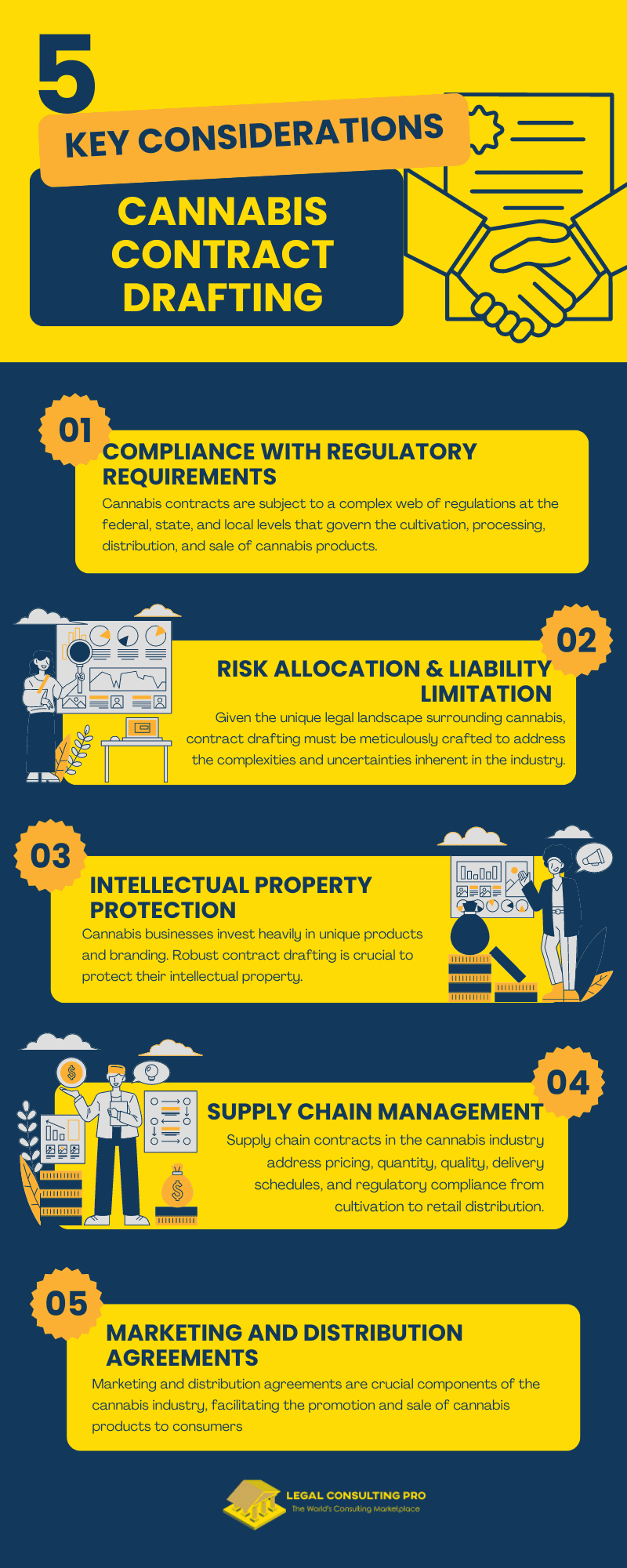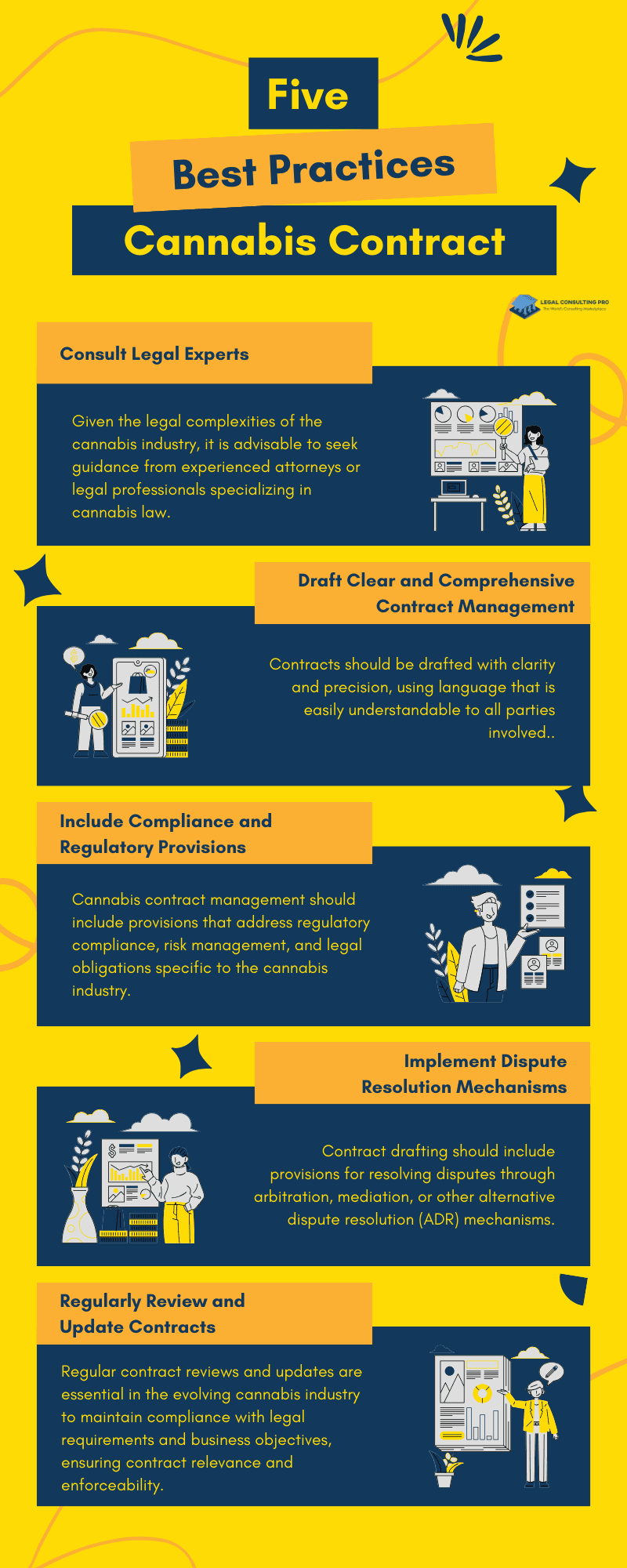Introduction
The legalization of cannabis for medical and recreational use has sparked a burgeoning industry, with entrepreneurs, investors, and stakeholders eager to capitalize on the opportunities it presents. However, the complex legal landscape surrounding cannabis requires careful navigation, particularly when it comes to contract drafting that governs various aspects of cannabis-related businesses. In this article, we will explore the intricacies of cannabis contract drafting, highlighting key considerations, challenges, and best practices to ensure compliance and mitigate risks in this rapidly evolving industry.
What are Cannabis Contracts?
Cannabis contract drafting is legal agreements that govern various aspects of transactions and relationships within the cannabis industry. This contract management covers a wide range of activities, including cultivation, manufacturing, distribution, retail sales, licensing, and partnerships. Cannabis contracts define the rights, obligations, and responsibilities of the parties involved, outlining terms such as pricing, delivery schedules, quality standards, intellectual property rights, compliance requirements, and dispute resolution mechanisms. Given the unique legal and regulatory landscape of the cannabis industry, these contract drafting must comply with local, state, and federal laws governing cannabis cultivation, distribution, and sales. Therefore, cannabis contract management requires careful drafting and management to ensure compliance, protect parties’ interests, and mitigate legal risks.
Understanding the Legal Framework
Before delving into cannabis contract drafting, it is essential to understand the legal framework governing the cannabis industry. While cannabis laws vary significantly from jurisdiction to jurisdiction, they generally encompass regulations related to the cultivation, manufacturing, distribution, retail sales, marketing, and consumption of cannabis products. Contract drafters must be well-versed in both federal and state regulations, including licensing requirements, taxation, packaging and labeling rules, and restrictions on advertising and sales to minors.
Furthermore, the legal landscape surrounding cannabis is continuously evolving as more states and countries legalize cannabis for medical and recreational use. This dynamic regulatory environment poses unique challenges for contract drafters, who must stay abreast of legislative changes and court rulings that may impact the legality and enforceability of cannabis contract management. Additionally, cannabis businesses operate in a highly regulated industry subject to scrutiny from regulatory agencies and law enforcement, making compliance with applicable laws and regulations paramount.
In light of these legal complexities, cannabis contract drafting requires a meticulous approach to ensure compliance and mitigate legal risks. Contract drafting must be carefully tailored to address the specific requirements and constraints of the cannabis industry while providing adequate protections for all parties involved. From licensing agreements and supply chain contract management to marketing and distribution agreements, each contract must be customized to reflect the legal and regulatory framework governing cannabis operations in the relevant jurisdiction.
Moreover, given the federal illegality of cannabis in many countries, including the United States, contract drafters must navigate potential conflicts between state and federal laws. This requires careful consideration of the legal risks and implications associated with engaging in cannabis-related activities, particularly in states where cannabis remains illegal under federal law. Contract provisions may need to be drafted to account for the possibility of federal enforcement actions or changes in federal policy regarding cannabis.
Key Considerations in Cannabis Contract Drafting
Compliance with Regulatory Requirements:
Cannabis contracts are subject to a complex web of regulations at the federal, state, and local levels that govern the cultivation, processing, distribution, and sale of cannabis products. In the United States, cannabis remains illegal under federal law, classified as a Schedule I controlled substance under the Controlled Substances Act (CSA). However, many states have legalized cannabis for medical and/or recreational use, creating a patchwork of regulatory frameworks that businesses must navigate.
At the federal level, cannabis businesses must comply with regulations enforced by agencies such as the Drug Enforcement Administration (DEA), the Food and Drug Administration (FDA), and the Internal Revenue Service (IRS). These regulations cover various aspects, including licensing requirements, product safety and labeling standards, and tax obligations.
In addition to federal regulations, cannabis businesses must also adhere to state-specific laws and regulations. These can vary significantly from state to state and may include licensing requirements, zoning regulations, product testing and packaging requirements, advertising restrictions, and restrictions on the types and amounts of cannabis products that can be sold.
Local governments may also impose their regulations on cannabis businesses, such as zoning ordinances, business licensing requirements, and operational restrictions.
Failure to comply with these regulations can result in severe consequences, including fines, license revocation, and even criminal charges. Therefore, cannabis contract drafting must be carefully drafted to ensure compliance with all applicable laws and regulations, protecting the interests of the parties involved and mitigating legal risks.
Risk Allocation and Liability Limitation:
In the nascent and rapidly evolving cannabis industry, where legal uncertainties abound, contract management plays a pivotal role in providing clarity, defining responsibilities, and managing risks. Given the unique legal landscape surrounding cannabis, contract drafting must be meticulously crafted to address the complexities and uncertainties inherent in the industry.
One crucial aspect of cannabis contract management is defining the rights, obligations, and liabilities of the parties involved. This includes clearly outlining the scope of work, deliverables, and timelines, as well as specifying the responsibilities of each party. For example, in a contract between a cannabis cultivator and a distributor, the agreement should delineate the quantity and quality of cannabis products to be supplied, delivery schedules, and payment terms.
Moreover, indemnification provisions are essential to protect parties from potential legal liabilities. In the cannabis industry, where regulatory compliance is paramount, indemnification clauses can shield parties from losses, damages, or penalties arising from violations of laws or regulations. For instance, if a distributor faces fines for selling non-compliant cannabis products, an indemnification clause may require the cultivator to compensate the distributor for any resulting losses.
Intellectual Property Protection:
In the burgeoning cannabis industry, where innovation and creativity are driving forces, protecting intellectual property (IP) rights is paramount for businesses to maintain their competitive edge and safeguard their innovations. Cannabis businesses invest substantial resources in developing and refining unique strains, products, branding, and proprietary technologies, making it essential to secure their intellectual property through robust contract drafting and legal mechanisms.
One crucial aspect of cannabis contracts is the inclusion of provisions for protecting intellectual property rights. This entails defining and safeguarding various forms of intellectual property, including trademarks, patents, trade secrets, and copyrights, through licensing agreements, non-disclosure agreements (NDAs), and confidentiality clauses.
Trademarks play a vital role in protecting the branding and identity of cannabis products and businesses. Cannabis contract management should include provisions for trademark licensing agreements, allowing businesses to license their trademarks to other parties for use in marketing, advertising, and product labeling. These agreements outline the terms and conditions of trademark usage, including restrictions on how the trademark can be used and quality control measures to maintain brand integrity.
Similarly, patents are crucial for protecting innovative technologies, processes, and formulations developed by cannabis businesses. Contract drafting should address patent licensing agreements, enabling businesses to license their patented technologies to third parties in exchange for royalties or other compensation. These agreements establish the rights and obligations of the parties regarding the use, reproduction, and commercialization of patented inventions, ensuring that inventors are appropriately compensated for their innovations.
Trade secrets, such as proprietary cultivation techniques, extraction methods, and formulations, are also valuable assets in the cannabis industry. Contract drafting should include robust confidentiality clauses and NDAs to protect trade secrets from unauthorized disclosure or use by third parties. These provisions establish legal obligations for parties to maintain the confidentiality of sensitive information and outline remedies for breaches of confidentiality, such as injunctive relief and monetary damages.
Supply Chain Management:
Contract drafting related to the supply chain is fundamental in the cannabis industry, governing various aspects from cultivation to retail distribution. In the complex landscape of cannabis business operations, contract drafters face unique challenges in addressing issues such as pricing, quantity, quality standards, delivery schedules, and regulatory compliance.
Cannabis cultivation agreements set the foundation for the supply chain by defining the terms of engagement between cultivators and suppliers. These contract management outline critical details such as the types of cannabis strains to be cultivated, cultivation methods, production volumes, and quality control measures. Pricing mechanisms, including fixed pricing, tiered pricing, or revenue-sharing arrangements, are also established to ensure fair compensation for both parties.
Processing agreements govern the transformation of raw cannabis materials into various derivative products such as oils, extracts, edibles, and topicals. Contract drafters must specify the processing techniques, quality standards, and regulatory requirements applicable to the production process. Additionally, these contracts may address issues related to product testing, labeling, packaging, and compliance with health and safety regulations.
Distribution agreements regulate the transportation and wholesale distribution of cannabis products from manufacturers to retailers. These contract draftings establish the terms of engagement between distributors and suppliers, including pricing, delivery schedules, minimum order quantities, and compliance with transportation regulations. Distribution agreements may also include provisions for warehousing, inventory management, and product recall procedures to ensure efficient logistics operations.
Retail agreements govern the sale of cannabis products to consumers through dispensaries, retail stores, or online platforms. Contract drafters must address issues such as product pricing, promotional activities, product placement, and compliance with state and local regulations governing retail operations. Additionally, these contract management may include provisions for product warranties, returns, and customer service standards to enhance the overall consumer experience.
Marketing and Distribution Agreements:
Marketing and distribution agreements are crucial components of the cannabis industry, facilitating the promotion and sale of cannabis products to consumers. These contracts govern the relationship between manufacturers or cultivators and marketing or distribution partners, outlining key terms and obligations to ensure the effective promotion and distribution of cannabis products.
One of the primary considerations in marketing and distribution agreements is compliance with the complex regulatory framework governing cannabis advertising and promotion. Cannabis businesses must navigate stringent restrictions on advertising, branding, packaging, and labeling imposed by state and local regulations. Contract drafters must carefully outline the permissible marketing channels, messaging, and content to ensure compliance with applicable laws and regulations while effectively promoting the brand and products.
Additionally, marketing and distribution agreements specify the roles and responsibilities of each party regarding product promotion and sales. This includes delineating the territories in which the distributor is authorized to market and sell the products, as well as any exclusivity or non-compete clauses that may apply. Clear delineation of responsibilities helps prevent conflicts and ensures smooth collaboration between the manufacturer or cultivator and the marketing or distribution partner.
Pricing and payment terms are also critical aspects of marketing and distribution agreements. Contract drafters must establish pricing structures, including wholesale pricing, discounts, and incentives, to ensure profitability for both parties. Payment terms, such as payment schedules, invoicing procedures, and methods of payment, should be clearly defined to avoid misunderstandings and disputes.

Challenges in Cannabis Contract Drafting
Despite the growing legalization and acceptance of cannabis, the industry still faces numerous legal and regulatory challenges, which can complicate contract drafting. Some of the challenges include:
- Evolving Regulatory Landscape: The cannabis industry is subject to rapid regulatory changes and evolving legal frameworks, making it challenging for contract drafters to stay updated and compliant with the latest laws and regulations.
- Federal-State Conflict: While many states have legalized cannabis for medical or recreational use, it remains illegal at the federal level. This creates a complex legal environment with potential conflicts between state and federal laws, particularly concerning banking, taxation, interstate commerce, and intellectual property rights.
- Banking and Financial Services: Due to federal prohibition, cannabis businesses often face difficulties accessing banking and financial services, leading to cash-intensive operations and limited financing options. Contract drafters must navigate these challenges when structuring payment terms, financing arrangements, and banking relationships in cannabis contract drafting.
Best Practices in Cannabis Contract Drafting
- Consult Legal Experts: Given the legal complexities of the cannabis industry, it is advisable to seek guidance from experienced attorneys or legal professionals specializing in cannabis law. They can provide valuable insights, ensure compliance with applicable regulations, and draft contract management tailored to the specific needs and risks of cannabis businesses.
- Draft Clear and Comprehensive Contract Management: Contracts should be drafted with clarity and precision, using language that is easily understandable to all parties involved. Clear definitions, detailed provisions, and explicit terms and conditions help minimize ambiguities, misunderstandings, and disputes down the line.
- Include Compliance and Regulatory Provisions: Cannabis contract management should include provisions that address regulatory compliance, risk management, and legal obligations specific to the cannabis industry. This may include representations and warranties regarding compliance with state and local laws, indemnification for regulatory violations, and mechanisms for resolving disputes related to regulatory matters.
- Implement Dispute Resolution Mechanisms: Contract drafting should include provisions for resolving disputes through arbitration, mediation, or other alternative dispute resolution (ADR) mechanisms. These provisions can help parties avoid costly and time-consuming litigation and achieve faster resolution of disputes confidentially and impartially.
- Regularly Review and Update Contracts: The cannabis industry is constantly evolving, with changes in laws, regulations, market dynamics, and business practices. Contract drafters should regularly review and update contracts to reflect the latest legal requirements, industry standards, and business objectives, ensuring that contract drafting remains relevant and enforceable over time.

Conclusion
Cannabis contract drafting requires a thorough understanding of the legal, regulatory, and business considerations unique to the cannabis industry. By incorporating best practices, consulting legal experts, and staying informed about changes in laws and regulations, cannabis businesses can draft contracts that protect their interests, ensure compliance, and mitigate risks in this rapidly growing and evolving industry.
By adhering to these best practices and leveraging the expertise of legal professionals, cannabis businesses can navigate the legal maze of the industry with confidence, ensuring that their contract management is legally sound.
Similar blogs:
Contract Drafting: Navigating the NFT Boom in the Digital Art Market
Contract Drafting: Sustainable Supply Chains: Incorporating Environmental and Social Responsibility







































